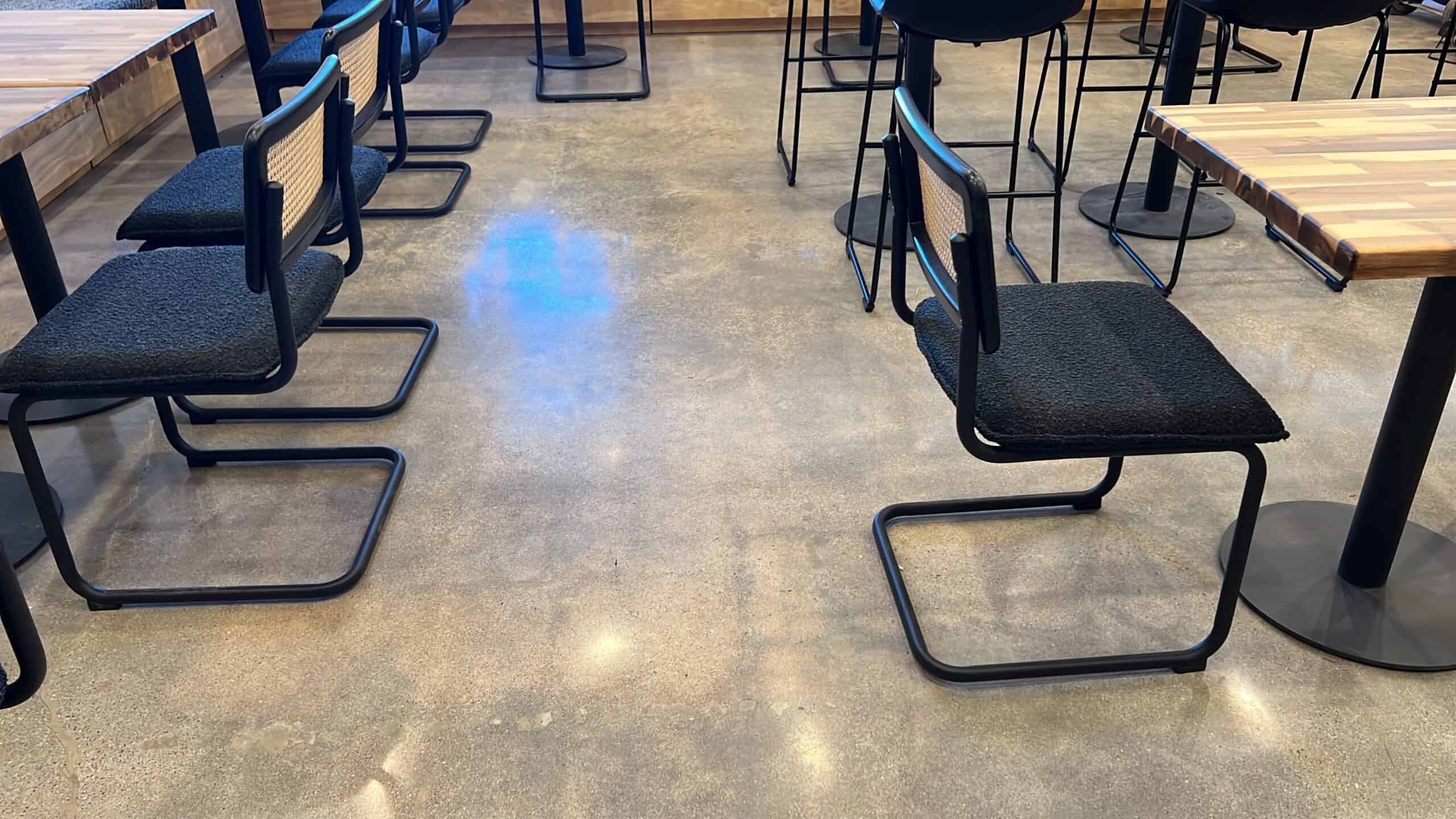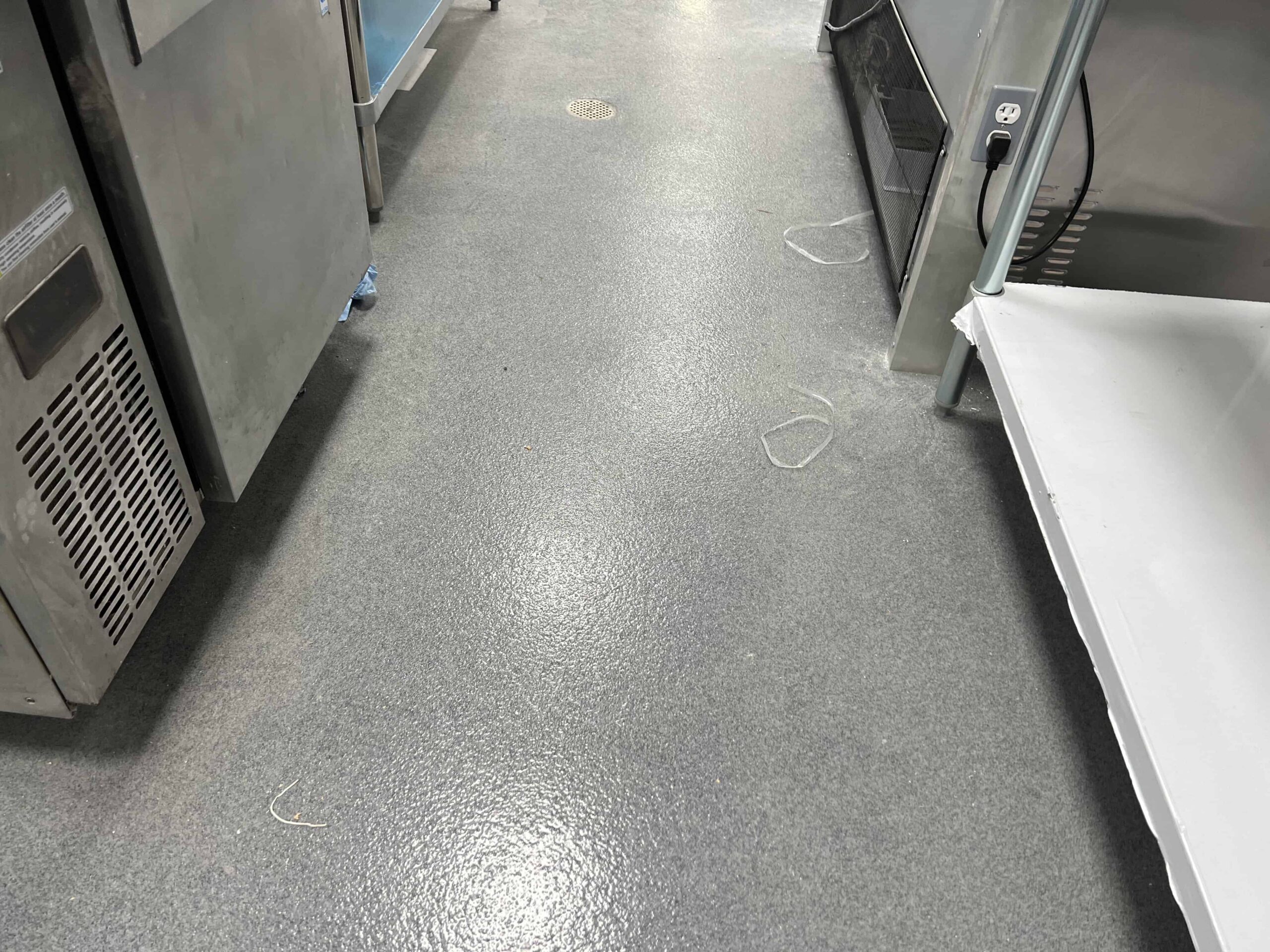
Commercial Kitchen Floors in Huntington Beach, Orange County
Restaurant floors have highly specified requirements for an industrial setting. Decorating decisions often divide into front-of-house and kitchen spaces. Buildings often used multiple styles and materials in the design. The popularity of open-concept dining and food preparation or cooking stations in the dining area means that floors must now be multipurpose and uniform throughout the property. Restaurant floors must meet kitchen standards while looking presentable to dinner guests.
Custom Performance Floors Concrete Coating and Polishing has operated out of Huntington Beach and Orange County for 25 years. Our team of experts has worked on commercial flooring solutions throughout the nearby southern California area, including Los Angeles, San Diego, Irvine, and Anaheim. We know about commercial kitchen facilities and restaurants anywhere from Fullerton to Laguna Niguel, Newport Beach to Lake Forest. You can reach out to us at the phone number on this site for a free quote for your flooring needs.
Commercial Kitchen Flooring Must Last
A busy restaurant does not have time to shut down its service for extended periods, and certainly not for days. Any design elements must be durable and hardy so that a commercial kitchen does not need to close for repairs, losing valuable money. Cleaning and maintenance must be completed during closed times after each day’s last service while meeting food safety guidelines.
Kitchens are high-traffic areas, and the floors take a beating daily. A typical laminate that could work for your space at home will not cut it in a commercial setting. This surface must be high quality if a restaurant has an open-concept floor plan and the same flooring feature throughout the kitchen, dining room, entrance, and restrooms.
Anyone owning a commercial kitchen space knows the value of having a solid flooring material compared to trendy or on-sale decor. Frequent renovations to replace floor coverings is not financially feasible. The time that floor installation might take also means no food service, and thus no income is coming in, while all the money is going out to expenses.
A commercial kitchen floor differs from that of other commercial operations in the constant level of threat that exists for it. Kitchen floors feel varying extreme temperatures. Walk-in coolers and freezers are close to the floor spaces under ovens and deep fryers. Floor drains near dishwashing areas come into contact with hot water and food particles daily. Certain foods or utensils impact the floors when dropped and can scratch or cause abrasions. A constant stream of staff moving through the kitchen and dining area spaces can lead to the erosion of weaker floor materials.
Food safety and kitchen sanitization standards require heavy-duty chemicals for regular cleaning, so these harsh solutions are poured onto or mopped into floors daily. Commercial kitchen operators must use durable, quality flooring materials to save money in the long term, or more money will be spent and not recovered in the future.
 Request a Quote
Request a QuoteCommercial Kitchen Floor Cleaning Standards
Sanitization standards in commercial kitchen spaces are undeniably stringent and for excellent reasons. Maintaining impeccable cleanliness is paramount, and this requires the use of potent cleaning products. It’s imperative for kitchen staff to diligently follow these cleaning protocols on a regular basis. Any lapse in the cleaning regimen can lead to heightened risks of contamination, potentially resulting in staff or guests contracting infections, which could have severe health implications. Additionally, failing to adhere to these rigorous standards can also impact insurance coverage, potentially leading to complications and liabilities for the establishment.
The choice of flooring in a commercial kitchen is critical, as it must not only adhere to strict cleanliness standards but also withstand exposure to harsh ingredients and constant cleaning routines. High-quality flooring should have minimal to no weak spots that could potentially allow harmful substances to penetrate. For instance, traditional kitchen floor tiles can present challenges, as they can trap dirt, food particles, chemicals, and liquids in the gaps between them. Moreover, the grout lines and areas where the floor meets the wall can become breeding grounds for bacteria if not thoroughly cleaned and maintained. Therefore, ensuring hygienic cleaning practices is essential for food safety, serving as a crucial measure to protect both patrons and staff from potential health hazards.
Incorporating flooring materials and designs that are inherently resistant to moisture, chemicals, and bacterial growth can significantly aid in maintaining the stringent sanitation standards required in commercial kitchens. Seamless and impermeable flooring options, such as epoxy coatings or resinous flooring systems, are particularly effective in preventing the accumulation of contaminants and providing ease of cleaning. Properly designed and installed commercial kitchen flooring not only supports a safe and hygienic environment but also contributes to the overall efficiency and functionality of the kitchen space.
Safety is the Number One Priority in Commercial Kitchen Spaces
Occupational safety in commercial establishments, particularly in the food service industry, places a strong emphasis on the flooring’s resilience and traction. The condition of flooring materials is crucial, as they can lose their texture and level due to heavy traffic and the erosive effects of continuous wear. Such wear and tear can create hazardous conditions in the workplace, making accidents more likely. Workplace accidents not only pose risks to the well-being of employees and guests but can also result in significant financial liabilities for employers, including medical expenses and potential legal claims.
In a restaurant or commercial kitchen environment, ensuring the safety of serving staff, kitchen team members, and guests is paramount. The potential hazards are numerous, from the risk of slips and falls due to spilled liquids and debris to the possibility of injuries resulting from slips or trips. Maintaining a floor with proper traction and slip resistance is non-negotiable to mitigate these risks effectively. While investing in safety upgrades may entail initial costs, it is a valuable and responsible expense. Preventing accidents and ensuring the well-being of employees and patrons should always be a top priority.
The proactive approach to safety not only fosters a secure environment but also promotes a positive reputation for the business. Patrons and employees alike appreciate and trust establishments that prioritize safety, which can lead to increased customer loyalty and a better overall work atmosphere. In the long run, prioritizing safety through appropriate flooring choices and maintenance is a sound investment that can help prevent accidents, protect lives, and safeguard the financial interests of businesses in the food service industry.
Polished Concrete Floors for Commercial Kitchens
Concrete strength lends itself nicely to both industrial and commercial floors. The proper treatment of concrete builds the material’s durability, low maintenance, and attractiveness. Using concrete floors throughout a commercial kitchen and dining area is common.
A solid concrete floor that has been ground and polished no longer has porous openings for moisture to enter. Without water getting into cracks, corners, and gaps in the foundation of the kitchen, bacteria will be less able to establish a foothold and multiply.
The spilled liquid will often pool on top of polished concrete as the surface became nonabsorbent with the grinding. The kitchen operator can apply additives with the polishing to make the dense concrete resistant to all liquids or specific chemicals. Easy-to-spot messes on easy-to-clean surfaces mean regular removal of spills and no chance for bacterial buildup.
Polished concrete is so strong that dropped knives and utensils will not chip or crack the floors and create openings for mold or bacteria spread. The maintenance for polished concrete floors is minimal, and repolishing does not need to repeat for many years. The savings from infrequent repairs and maintenance make the investment worthwhile.
Polishing and heavy foot traffic do not remove traction from concrete. For added peace of mind, however, we can include non-slip additives to the polishing process in the kitchen, walkways, and entrances.
Orange County’s Custom Performance Floors can provide a quote for the polishing service. Costs will depend on the sq ft of the space requiring the treatment and the number of additives and preparatory work needed to ready the concrete for grinding. Call us today, and we’ll create an estimate for your southern California business.



Commercial Kitchen Epoxy Floors
Concrete floors can have layers of resin built on top to create a powerful yet versatile flooring system in a commercial kitchen (or restaurant). Epoxy can customize with flake, metallic or clear resin layers, or concrete stain added to match the interior design of the building.
Non-slip additives reduce the likelihood of accidents occurring on the workplace floor, which is on top of the natural traction of the resins. Liquid and chemical-resistant additives can be included in the epoxy layers so that the floors are non-absorbent. Harsh chemical cleaners won’t break down the epoxy and eat away at the concrete. The product is durable, and Custom Performance Floors backs our epoxy with a 10-year warranty.
Epoxy dries with a seamless finish, leaving no vulnerable spots, even in corners or at the wall. Nothing can penetrate the epoxy layers to cause concerns regarding food safety and hygiene practices.
Maintenance costs for epoxy. flooring is low. The installation costs depend on the size of the space, the customizations, and the project’s complexity.
When you contact us for a quote for your commercial kitchen floors, our Orange County commercial flooring experts will give you the full scoop. We will present you with your decorative options, coating possibilities, and finish recommendations to make your space safe and functional for the long term.
We look forward to collaborating with you!



Frequently Asked Questions
What are commercial kitchen floors?
Commercial kitchen floors are specialized flooring solutions designed for use in professional kitchens, such as those in restaurants, hotels, and foodservice establishments.
What types of flooring are suitable for commercial kitchens?
Suitable flooring materials for commercial kitchens include ceramic tile, quarry tile, vinyl composition tile (VCT), epoxy, and stainless steel.
Why are commercial kitchen floors different from regular floors?
Commercial kitchen floors are designed to withstand heavy foot traffic, spills, grease, and high-temperature conditions, which are common in professional kitchen settings.
How do I maintain the cleanliness of commercial kitchen floors?
Regular cleaning with appropriate commercial-grade cleaning agents and equipment is crucial to maintain the cleanliness of kitchen floors. Daily sweeping, mopping, and occasional deep cleaning are essential.

